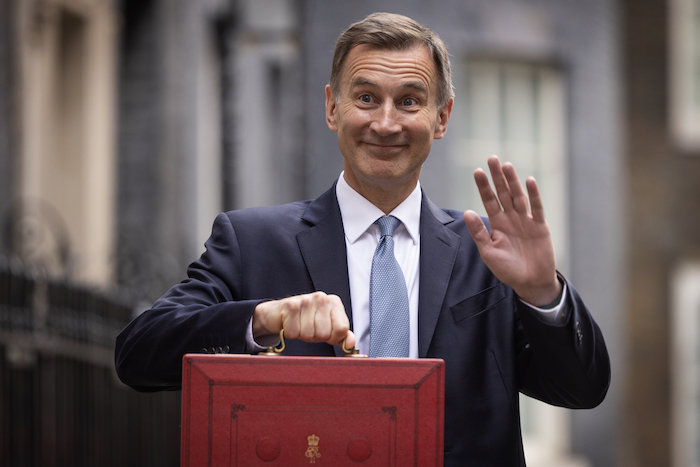About halfway through his Budget speech, Jeremy Hunt was making a joke about returning from retirement on the backbenches in his fifties to a new career in finance. ‘How’s it going?’ heckled one opposition MP. The Commons erupted into laughter. ‘It’s going well, thank you!’ Hunt replied merrily.
The speech itself did go smoothly: Tory MPs were quite quiet for passages of it, while Hunt made few jokes. He themed it around four words beginning with ‘E’. It might have been irresistibly hilarious for most MPs to listen to a less straight-laced Chancellor than Hunt saying ‘moving on to my second E’. But the intentional boringness of this government meant most of the (hollow) laughter was directed at any statements Hunt made about how well his party had handled the economy over the past few years – and at Rishi Sunak’s private swimming pool.
Those four Es are ones the Chancellor has been talking about for a while – enterprise, education, employment and everywhere – and they included a number of big retail offers Hunt was clearly proud of. The big announcements he hoped MPs would cheer the most were free childcare hours for all children from nine months onwards, rather than three years; wraparound childcare at all schools from 8 a.m. – 6 p.m. and abolishing the lifetime allowance on pension savings. Neither announcement had been fully trailed before the Budget: he was expected to do something extending the free hours to younger children, and had reportedly been preparing an announcement raising the pensions allowance from £1.07 million to £1.8 million. Both were aimed at breaking down major barriers to people staying in, or returning to, the workplace.
Another huge announcement that has been very long in its gestation and will likely take up a great deal of government time and energy in the coming months is a huge overhaul of the disability benefit system to focus on what claimants can do, rather than what they can’t. The always-controversial Work Capability Assessment will go, and claimants are now promised that they can seek work without fearing the loss of their financial support. The Conservatives were the party who extended this Labour-designed system, but are now turning their backs on it.
They are also turning their backs on their own Local Enterprise Partnerships, with Hunt today announcing that responsibility for local economic growth will go back from LEPs to local authorities by April 2024. This is surely an admission that the enterprise-led approach hasn’t worked, and is a curious example of the Tories giving more powers to local government. Mayors are to get more powers over regional spending – something I revealed Hunt was working on back in the Autumn – and Hunt named 12 new investment zones which he promised (rather threateningly for anyone who has spent much time there) would create ’12 new Canary Wharfs’.
As I wrote earlier, Tory MPs are looking for a suggestion from the Chancellor that he does actually believe in low taxes, and he did say that, while defending the planned rise in corporation tax. But in the Commons, key members of the Conservative Growth Group such as Simon Clarke were nodding thoughtfully along to Hunt’s announcement on companies being able to offset investment in equipment against their profits – this was intended to cheer Tory backbenchers up. Hunt did what all Chancellors like to and mentioned the MPs who had campaigned for particular announcements – along with one of the councillors in his own constituency who has been pressing for more money on potholes. But he also tried to butter up his own Cabinet colleagues by introducing their names along with what he thought were suitable adjectives. Thus Grant Shapps was the ‘energetic’ Energy Security Secretary, Michelle Donelan was the ‘talented’ science and technology cabinet minister. Ben Wallace and Johnny Mercer, who have conducted most of their Budget negotiations with Hunt as though they are actually at war with him, were described as ‘persuasive’ – Hunt smiling rather wryly as he said those words.
So much of the Budget speech was written with a view to those Tory colleagues, persuasive or otherwise, that Labour barely figured at all, save from a couple of quips about saving Labour the ‘bother’ of trying to work out what to say about tax by offering the line ‘they put them up, we cut them’, and joking about the Opposition party’s support for nuclear energy. But the political theme of the back-to-work Budget was about getting the party back to work, not laying electoral traps for Labour. In previous years, this might have been because the party was in such an internal mess and so behind in the polls that it was scarcely worth bothering with them. Today, though, it showed how un-political Hunt is as a politician, even one preparing for an election campaign which has the potential to put the Conservatives out of work.







Comments